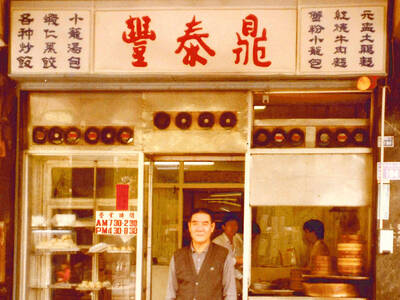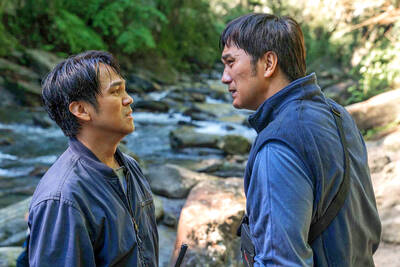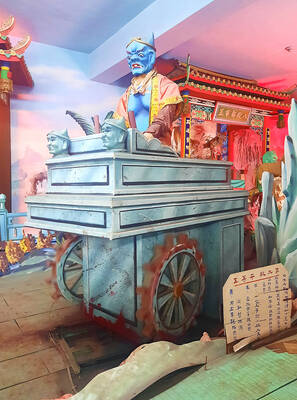It doesn’t look much like a typical health food store. That’s because the Gongguan Collection Center (公館取貨站) of the Homemaker’s Union Consumer’s Co-op (台灣主婦聯盟生活消費合作社) isn’t one at all, even though it does sell fruit, vegetables, meat and household items that are grown or produced without the benefit of chemicals. The center is one of a growing number of outlets in a network around Taiwan established by the co-op to provide environmentally friendly, healthy foods. The co-op also aims to lead consumers to a better understanding of how they can make a difference on the environment.
“We are all natural-born consumers, so the consumer’s co-op was an obvious way to proceed,” Chen Hsiu-chi (陳秀枝), chairman of the co-op. Above, she said, consumers should feel they have a stake in the environment from which the products they buy come from.
The co-op is not just about selling produce. “We actually make it just a little bit troublesome for people,” Chen said, citing as examples the up-front membership fee and the requirement that new members attend a lecture on the co-op’s goals.
This is a very different approach from high-profile establishments that have sprung up in response to the demand for foods that are healthier and more natural, the latter term meaning foods that are produced without the use of chemicals such as hormones and antibiotics. There is Cotton Fields (棉花田, www.sun-organism.com.tw), with its emphasis on prepackaged health supplements; and Yuen Foong Yu (永豐餘生技, www.green-n-safe.com) and Tanhou (天和鮮物, www.thofood.com), which both combine high-tech and organic agricultural practices to appeal to a health-conscious financial and intellectual elite; and Li-Ruhn (里仁事業, www.li-ruhn.com), which takes its inspiration from Buddhist beliefs in man’s oneness with the natural world.
Unlike these organizations, the Homemaker’s Union Consumer’s Co-op focuses on the environment, not the individual. “We are about keeping the environment healthy. The benefit to human health is an offshoot of this,” Chen said. Established in 2001, the co-op emerged out of the Homemaker’s Union and Foundation (主婦聯盟環境保護基金會), which has its roots in the environmental activism of the 1980s and has played an important role shaping a more environmentally conscious Taiwan.
“We want to work in a preventative way. We emphasize loving our bodies and our environment, together. To care for your health, you must care for the environment. If you don’t have a good environment, you cannot grow good things, and if you can’t grow good things, then you won’t have a healthy body,” Chen said.
A GRADUAL Approach
The co-op avoids using the term “organic” and has developed its own certification process. The reasons are two-fold. The first is the expense of government certification, which, said general manager Huang Jen-tung (黃仁棟), prevents most small farmers from participating. The second is that the term is not always meaningful on a small, densely populated island rife with cross-contamination of crops.
“In the Homemakers Union there were many people who were concerned about the environment,” Chen said during an interview at the co-op’s headquarters in a refurbished factory in Sanchong, Taipei County.
Aware of the high levels of contamination in the soil and numerous scandals associated with intentional contamination of imported food products, some members of the foundation decided to take control by instituting a system of collective purchasing directly from local farmers.
Chen put the dilemma faced by mothers in this way: “Should they give their children more to eat so they would grow strong, or less to eat so they wouldn’t be poisoned?” The only way out was to contact farmers directly and encourage them to use natural methods of cultivation by guaranteeing the purchase of the crop.
“We will even offer a better price for farmers who achieve lower levels of contaminants,” Huang said.
In recent years Chen has found that many farmers were realizing the damage to their own health after years of using potent chemicals on their farms, and that this has made them more open to the co-op’s message of accepting lower yields produced by natural methods.
The co-op is its own arbiter of quality, and its three-tier labeling system — Environmentally Friendly (環保), Healthy (健康) and Safe (安全) — recognizes that for many small farmers a total rejection of chemicals is not feasible.
“Environmentally Friendly” is applied to products grown in a fully organically sustainable way, “Healthy” to products without pesticide residue, and “Safe” to products with residue that falls within acceptable limits. The co-op also tests for traces of nitrates, widely recognized as carcinogens that can result from over-fertilization, even when natural fertilizers are used.
For the co-op, which now sources its produce from hundreds of Taiwanese farmers, bypassing the government’s and the international community’s certifications is not simply a financial consideration. “It’s about establishing a relationship of trust,” Chen said. Though the co-op commissions chemical analyses of its products from independent foundations, Chen emphasized that many farmers have an ideological commitment that has more to do with handing down clean land to a new generation than ensuring that consumers live longer, healthier lives. She said the co-op develops close, often personal relationships with its farmers, pointing to the support programs it provides to help them through the often difficult transition to cleaner farming practices. “Of course, if they are in danger of losing their crop, they might have to use pesticides. We ask them to tell us,” Chen said, which thereby allows the co-op to adjusts its labeling.
THE CO-OP SPIRIT
Since its inception, the co-op has grown rapidly and now boasts nearly 30,000 members and 200 staff. Chen said that part of the challenge is the education of members, who need to adjust their values slightly when shopping at the co-op.
“In a regular shop you will go directly for the freshest produce on the shelves, leaving the rest,” Chen said. “But really we need people to understand that all the produce must be sold.” On a meal break at the co-op’s staff canteen, Huang half-jokingly said that all the dishes were made from “stuff that wasn’t selling so well.”
For Chen, the work of the co-op is not just about the here and now. It is about reviving respect for agriculture and handing it down to the next generation. “It is a relationship between people, and between people and the land,” she said. “The way we express this is through food.”
On the Net: More information about the Homemaker’s Union Consumer’s Co-op can be found at www.hucc-coop.tw (Chinese only)

March 24 to March 30 When Yang Bing-yi (楊秉彝) needed a name for his new cooking oil shop in 1958, he first thought of honoring his previous employer, Heng Tai Fung (恆泰豐). The owner, Wang Yi-fu (王伊夫), had taken care of him over the previous 10 years, shortly after the native of Shanxi Province arrived in Taiwan in 1948 as a penniless 21 year old. His oil supplier was called Din Mei (鼎美), so he simply combined the names. Over the next decade, Yang and his wife Lai Pen-mei (賴盆妹) built up a booming business delivering oil to shops and

Indigenous Truku doctor Yuci (Bokeh Kosang), who resents his father for forcing him to learn their traditional way of life, clashes head to head in this film with his younger brother Siring (Umin Boya), who just wants to live off the land like his ancestors did. Hunter Brothers (獵人兄弟) opens with Yuci as the man of the hour as the village celebrates him getting into medical school, but then his father (Nolay Piho) wakes the brothers up in the middle of the night to go hunting. Siring is eager, but Yuci isn’t. Their mother (Ibix Buyang) begs her husband to let

The Taipei Times last week reported that the Control Yuan said it had been “left with no choice” but to ask the Constitutional Court to rule on the constitutionality of the central government budget, which left it without a budget. Lost in the outrage over the cuts to defense and to the Constitutional Court were the cuts to the Control Yuan, whose operating budget was slashed by 96 percent. It is unable even to pay its utility bills, and in the press conference it convened on the issue, said that its department directors were paying out of pocket for gasoline

For the past century, Changhua has existed in Taichung’s shadow. These days, Changhua City has a population of 223,000, compared to well over two million for the urban core of Taichung. For most of the 1684-1895 period, when Taiwan belonged to the Qing Empire, the position was reversed. Changhua County covered much of what’s now Taichung and even part of modern-day Miaoli County. This prominence is why the county seat has one of Taiwan’s most impressive Confucius temples (founded in 1726) and appeals strongly to history enthusiasts. This article looks at a trio of shrines in Changhua City that few sightseers visit.